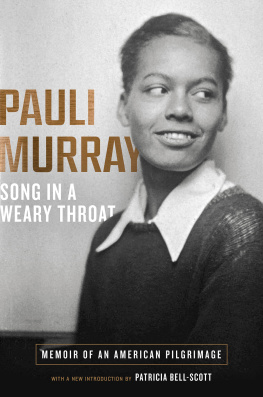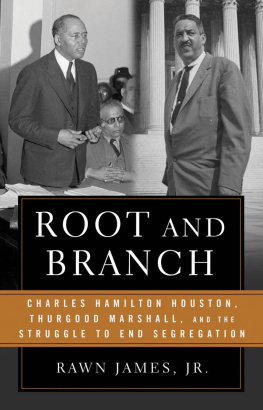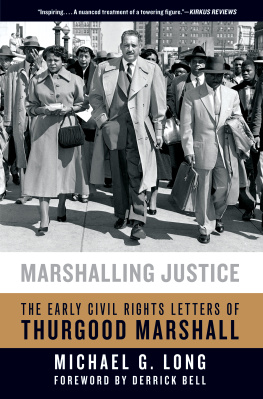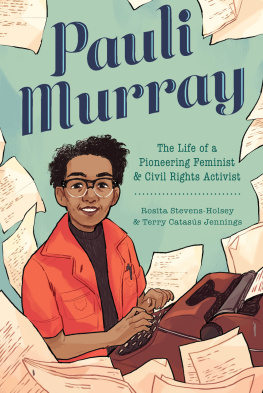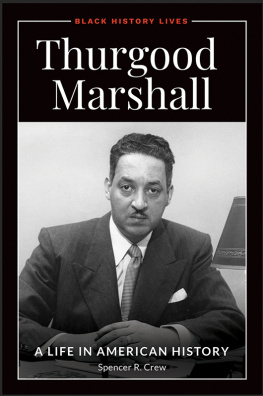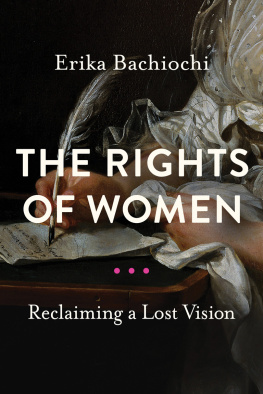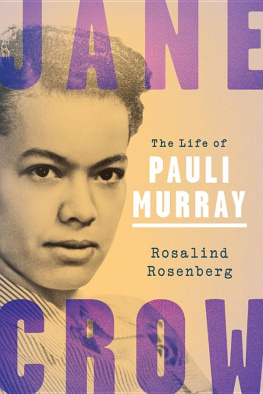
Song in a Weary Throat
ALSO BY PAULI MURRAY
Dark Testament and Other Poems
Proud Shoes: The Story of an American Family
States Laws on Race and Color
The Constitution and Government of Ghana (coauthor with Leslie Rubin)
Human Rights U. S. A.: 1948-1966
SONG
IN A
WEARY
THROAT
Memoir of an American Pilgrimage
PAULI MURRAY
With a new introduction by
Patricia Bell-Scott

LIVERIGHT PUBLISHING CORPORATION
A DIVISION OF W. W. NORTON & COMPANY
INDEPENDENT PUBLISHERS SINCE 1923
NEW YORK LONDON
Copyright 1987 by the Pauli Murray Foundation
Introduction copyright 2018 by Patricia Bell-Scott
Originally published under the title Song in a Weary Throat;
reprinted in paperback under the title The Autobiography of a
Black Activist, Feminist, Lawyer, Priest, and Poet
First published as a Liveright paperback 2018
All rights reserved
For information about permission to reproduce selections from this book,
write to Permissions, Liveright Publishing Corporation, a division of
W. W. Norton & Company, Inc., 500 Fifth Avenue, New York, NY 10110
For information about special discounts for bulk purchases, please contact
W. W. Norton Special Sales at specialsales@wwnorton.com or 800-233-4830
Book design by Dana Sloan
Production manager: Anna Oler
COVER DESIGN BY TIANI KENNEDY
COVER PHOTOGRAPHS: SCHLESINGER LIBRARY, RADCLIFFE INSTITUTE,
HARVARD UNIVERSITY
The Library of Congress has cataloged the printed edition as follows:
Names: Murray, Pauli, 19101985, author.
Title: Song in a weary throat : memoir of an American pilgrimage / Pauli
Murray ; with a new introduction by Patricia Bell-Scott.
Description: New York : Liveright Publishing Corporation, [2018] | Includes index.
Identifiers: LCCN 2017060529 | ISBN 9781631494581 (pbk.)
Subjects: LCSH: Murray, Pauli, 1910-1985. | African AmericansBiography. |
African American women lawyersUnited StatesBiography. |
FeministsUnited StatesBiography.
Classification: LCC E185.97.M95 A3 2018 | DDC 323.092 [B] dc23
LC record available at https://lccn.loc.gov/2017060529
ISBN 978-1-63149-459-8 (e-book)
Liveright Publishing Corporation, 500 Fifth Avenue, New York, N.Y. 10110
www.wwnorton.com
W. W. Norton & Company Ltd., 15 Carlisle Street, London W1D 3BS
To Maida
Incomparable companion, critic,
and guide on the pilgrimage
Hope is a crushed stalk
Between clenched fingers.
Hope is a birds wing
Broken by a stone.
Hope is a word in a tuneless ditty
A word whispered with the wind,
A dream of forty acres and a mule,
A cabin of ones own and a moment to rest,
A name and place for ones children
And childrens children at last...
Hope is a song in a weary throat.
from DARK TESTAMENT AND OTHER POEMS
Hope is a crushed stalk
Between clenched fingers
Hope is a birds wing
Broken by a stone.
Hope is a word in a tuneless ditty
A word whispered with the wind,
A dream of forty acres and a mule,
A cabin of ones own and a moment to rest,
A name and place for ones children
And childrens children at last...
Hope is a song in a weary throat.
From Dark Testament (1970)
I N AUGUST 1968, on her way back from visiting the Roosevelt cottage on Campobello Island, Pauli Murray stopped at Yellow Head Island in Maine, to visit her friend and mentor, the historian Caroline F. Ware, at her summer residence. Unreachable except by boat, the islands accommodations were spare, a log cabin heated only by a fireplace, but it offered an inspiring view of the coast of Maine. It was there that the seeds of a memoir were planted in Murrays mind. She spent her mornings watching ducks paddling around the head rock and her afternoons mulling over the memoirs structure and first paragraphs.
Three years later, having been able to write only during summer breaks, Murray had just four chapters. She was struggling, she acknowledged in a letter to Ware, with several issues, not least of which were the title, the relationship of the memoir to her family saga Proud Shoes, and the narrative perspective. Titles mattered tremendously to Murray, for they gave her focus. She would spend more than a decade searching for the perfect phrase to capture her experience as a self-described rebel, instigator, and survivor, at times a nettle in the body politic, an opener-of-doors, and always a devout child of God and friend of mankind. She tried out more than a dozen ideas before settling on a line from her epic poem, Dark Testament: Hope is a song in a weary throat. These words spoke to her heritage as well as her drive for excellence and wanting to belong.
She also struggled with the relationship of the memoir to her previous family saga, Proud Shoes, which she published in 1956. Here Murray had told the story of her maternal ancestors, the Fitzgeralds, as seen through the eyes of an observant child. Should this new memoir, she wondered, continue her family story, or should she start with her own adult story? She considered rewriting Proud Shoes and incorporating it into a larger work. Eventually, she arrived at a compromise. The first six chapters would focus on her childhood in Durham, North Carolina, and the rest would cast her adult life against the cultural landscape of twentieth-century America. Above all, she would tilt the memoir toward the social and political issues with which she was long engaged.
The result, when it was finally published in 1987, was a brilliant account of hard-won victories and agonizing defeats in the struggle for social justice. Murray recounts how in 1938 she applied for admission to the University of North Carolinas graduate program in sociology, only to find that the school rejected heras it legally couldbecause of her race. Four years later Harvard Law School barred her entry because she was female. But Murray, whose personal motto was Dont get mad, get smart, pushed forward, and she did indeed get smart, entering Howard University School of Law in 1941.
At Howard, she argued in a civil rights seminar that the NAACP should make a frontal assault on the constitutionality of segregation by documenting the psychological harm that segregated schooling inflicted on the well-being of black children. Her classmates and professor dismissed the idea and mocked her, the only female in her class. Offended but not discouraged, Murray penned an essay, Should the Civil Rights Cases and Plessy v. Ferguson Be Overruled? It ended up in the NAACPs reference files. Ten years later NAACP counsel Thurgood Marshall and his legal team used it to prepare for the 1954 Brown v. Board of Education case, by incorporating psychological research on the effects of segregation on black children.
Murrays ideas won the day: the Supreme Court unanimously ruled that racial segregation of the public schools violated the Equal Protection Clause of the Fourteenth Amendment. The NAACPs psychological research shines forth in Chief Justice Earl Warrens majority opinion: To separate them [black children] from others of similar age and qualifications solely because of their race generates a feeling of inferiority as to their status in the community that may affect their hearts and minds in a way unlikely ever to be undone.
Next page
